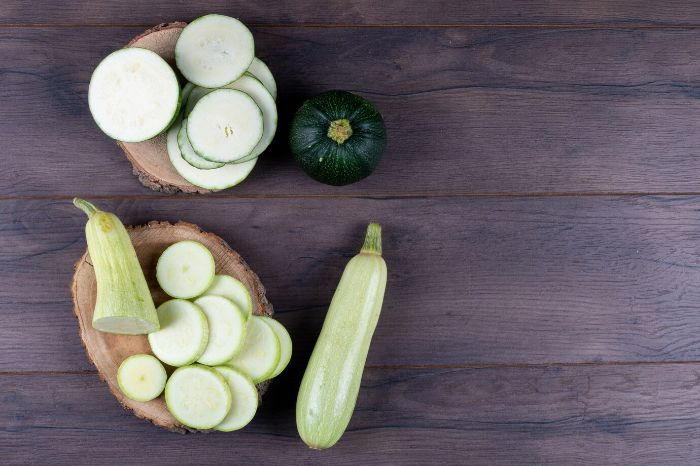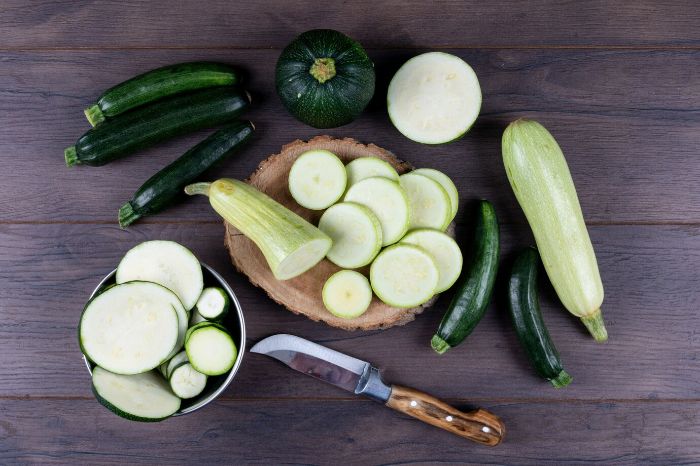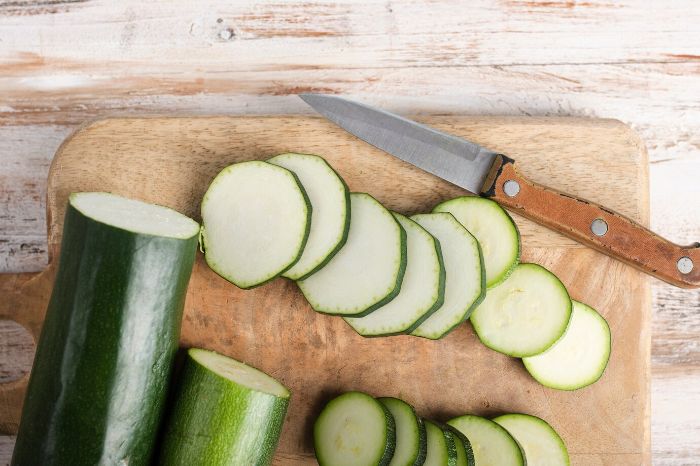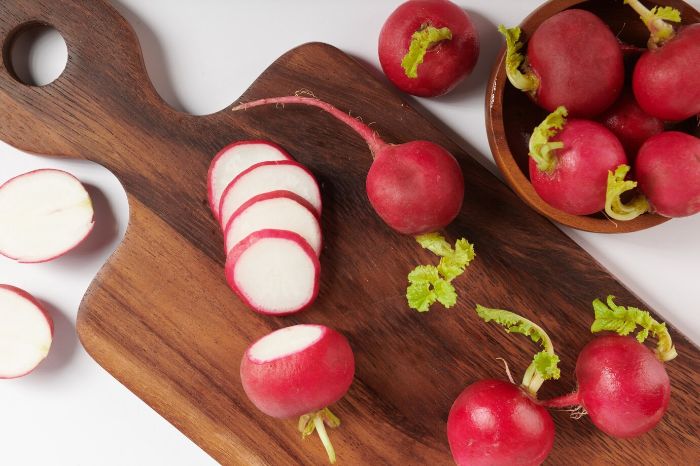Are you searching for a tasty and healthy vegetable to help with weight control? Zucchini is your answer! It’s a green veggie that’s low in calories but full of important nutrients. These nutrients can help you reach your weight goals. But why is zucchini so great for weight loss and health? Let’s explore the benefits of zucchini for managing weight and staying healthy.
Key Takeaways:
- Zucchini is a low-calorie vegetable that can be a valuable addition to weight management diets.
- It is rich in essential vitamins, minerals, and fiber, offering numerous health benefits.
- Zucchini promotes satiety, has a low glycemic index, and is high in water content, all of which play a role in weight management.
- Beyond weight loss, zucchini supports digestive, heart, and skin health.
- There are various ways to incorporate zucchini into your diet, including using it as a low-carb substitute and following proper buying and storing techniques.
Table of Contents
Nutritional Profile of Zucchini
Zucchini is not just tasty but also very good for you. It’s full of nutrients that make it great for any diet. Let’s explore its low calories, high nutrient levels, and the vitamins and minerals it has.
Low-Calorie Content
Zucchini is known for being low in calories. It has only 20 calories per cup. This makes it perfect for those watching their weight but still wanting to eat well.
You can eat a lot of zucchini without worrying about calories. It’s a great choice for many dishes.
High Nutrient Density
Zucchini is full of nutrients despite its low calories. It’s a great source of fiber, which helps with digestion and keeps you feeling full. It also has antioxidants that protect your body from harm.
Vitamins and Minerals in Zucchini
Zucchini is full of vitamins and minerals that are good for your health. It has a lot of vitamin C, which helps your immune system and keeps your skin healthy. Vitamin A in zucchini is important for your eyes and skin.
Zucchini also has potassium, which is good for your heart and muscles. And it has manganese, which helps with bones and metabolism.
How Zucchini Aids in Weight Management
Zucchini is a versatile vegetable that helps with weight management. It makes you feel full and satisfied. This makes it a great choice for a balanced diet.
Promotes Satiety
Zucchini is high in fiber, which slows down digestion. This makes you feel full longer. Adding zucchini to your meals can help you eat less and avoid high-calorie snacks.
It also makes meals more filling without adding many calories. This is great for those trying to lose weight.
Low Glycemic Index
Zucchini has a low glycemic index. This means it doesn’t cause a quick rise in blood sugar. Foods like zucchini are good for weight management because they give you steady energy and reduce cravings.
Adding zucchini to a low-carb or diabetic diet helps keep blood sugar stable. This prevents cravings for sugary foods.
High Water Content
Zucchini is also very watery. Water is key for staying hydrated and for your body’s functions. Eating foods like zucchini can make you feel full and keep calories low.

By choosing zucchini over other high-calorie foods, you can eat more without gaining weight. This doesn’t mean you have to give up on taste or satisfaction.
Health Benefits of Zucchini Beyond Weight Management
Zucchini helps with weight management and boosts overall health. It supports digestive, heart, and skin health. Adding zucchini to your meals can make you feel better.
Boosts Digestive Health
Zucchini is full of fiber, which keeps your digestive system healthy. Eating foods high in fiber like zucchini helps with bowel movements. It also stops constipation and supports your gut.
The fiber in zucchini helps with digestion. It keeps you full and stops you from eating too much.
Supports Heart Health
Zucchini is good for your heart. It has antioxidants like vitamin C that fight inflammation. This protects your heart from stress.
Zucchini also has potassium, which helps keep your blood pressure healthy. This lowers the risk of heart diseases. Eating zucchini can keep your heart strong and support your heart health.
Enhances Skin Health
Zucchini is great for your skin. It has vitamin C, which helps make collagen. Collagen keeps your skin young and firm.
Zucchini also has beta-carotene, which fights free radicals. This helps prevent skin aging. Eating zucchini can make your skin look better from the inside out.

Zucchini is more than just for weight loss. It’s good for your digestive, heart, and skin health. Adding zucchini to your meals can make you feel great.
Incorporating Zucchini into Your Diet
Zucchini is a tasty and creative way to eat healthy. It’s great for those on a low-carb or keto diet. You can swap it for high-carb foods like pasta or bread.

Zucchini as a Low-Carb Substitute
Zucchini is a great low-carb choice instead of pasta, rice, or bread. It helps you eat fewer carbs and enjoy a healthier meal.
For pasta fans, try zucchini noodles, or zoodles. Use them in zucchini spaghetti or zucchini lasagna. Zucchini takes on the flavors of sauces well, making it a tasty pasta substitute.
Zucchini can also be grated like rice. Use it in stir-fries, fried rice, or pilaf. It’s a nutritious, low-carb option for your meals.
Tips for Buying and Storing Zucchini
Choose zucchini that’s firm and looks good. The skin should be smooth and shiny. Don’t pick zucchini that’s soft or has mold.
Keep zucchini in the fridge’s crisper drawer for up to a week. But, use it within 2-3 days for the best taste and freshness.
If you have extra zucchini, freeze it. Wash, slice, and blanch it, then cool it in ice water. Dry it well before storing in containers or bags. Frozen zucchini is great in soups, stews, or baked dishes.
Start using zucchini in your meals today. Enjoy its low-carb benefits and health perks!
Conclusion – Embrace Zucchini for a Healthier Lifestyle
Zucchini is a superfood that can boost your health. Adding it to your meals can lead to a healthier life.
Zucchini helps with weight management. It’s low in calories but packed with nutrients. This makes it great for those trying to lose weight or stay healthy.
Zucchini does more than help with weight. It’s good for your overall health. It supports your digestive system and keeps your heart and skin healthy.
Adding zucchini to your meals is a smart move. You can use it in many tasty dishes. Try it in stir-fries, soups, or salads for a healthy twist.
Make zucchini a key part of your diet. It’s a simple way to improve your health. Start enjoying the benefits of zucchini today for a healthier life.
FAQ
Is zucchini a low-calorie vegetable?
Yes, zucchini is a low-calorie vegetable.
What nutrients are found in zucchini?
Zucchini is full of important vitamins and minerals. These include vitamin C, vitamin A, potassium, and manganese.
How does zucchini aid in weight management?
Zucchini helps with weight management in several ways. It makes you feel full, has a low glycemic index, and is high in water.
What are the health benefits of zucchini beyond weight management?
Zucchini is great for your digestive health, heart health, and skin health.










